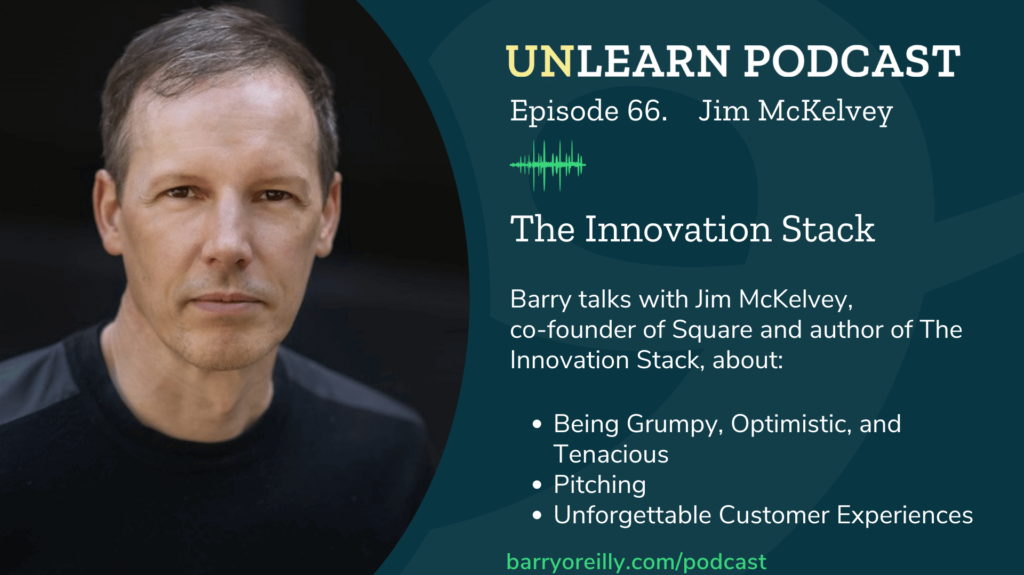Barry O’Reilly’s guest is Jim McKelvey, who has been everything from a glassblowing artist, to a founder of a multibillion-dollar organization. Just recently, he was appointed Chairman of the Federal Reserve Bank of St. Louis. Jim is the co-founder of Square, a leading financial services and digital payments company, and the author of The Innovation Stack: Building an Unbeatable Business One Crazy Idea at a Time, where he shares the story of building Square and his philosophy for building disruptive companies. His most recent startup, Invisibly, gives consumers control of how their personal data is monetized by advertisers. Jim treats listeners to some fun facts and tips he learned from his own journey in this week’s episode.
Be Grumpy, Optimistic and Tenacious
Innovation requires a “wonderful blend of grumpiness and optimism”, as well as a healthy dose of tenacity, Jim argues. Grumpiness makes you upset about a problem, and optimism inspires you to come up with a solution. Tenacity keeps you going through the tough times. “A lot of the companies that are now household names … began with a founder who just found themselves in a really unpleasant situation and didn’t quit,” Jim says. The mix of work ethic and stubbornness is often the secret sauce to your ultimate breakthrough. It’s not some special talent or heroic gift that makes innovators succeed, he and Barry agree. The most successful founders are just regular people; you just need the right tools, which Jim describes in his book. [Listen from 2:10]

Entertain Them
Barry loves The Innovation Stack for its amusing anecdotes and contrary approaches, one of his favorites being Jim’s approach to pitching investors. “People get pitching wrong,” Jim explains. “People spend a lot of time pitching as if they are trying to sell somebody something. I pitch as if I’m trying to entertain and invite them to partner with me, and it’s a subtle difference.” It’s your duty to entertain your listeners, he argues, especially if you want them to listen to you for more than 30 seconds. Throw some surprises in there as well to hold their attention. He describes how he used this tactic when he pitched Square. His pitch deck was lighthearted and fun, and even included 140 problems that would cause Square to fail. Investors weren’t expecting that. His strategy worked brilliantly because, as he explains, “If you start honestly discussing your problems people don’t just pile on; the natural response to that is to say, ‘Oh, I can help you fix that.’” He continues, “It was this wonderful experience to be in that room with us pitching because it wasn’t this sort of attack and defend scene that I see in almost every other pitch meeting.” [Listen from 8:55]
(Check out this podcast on Engaging in the Lives of Your Users with Donald Farmer)
Make it an Experience
Your product or service should be an unforgettable experience for your customers, one they want to revisit. Jim describes thinking through the design of a new drinking glass that will invoke the users’ senses and help them see the world in a new way. These types of hidden experiences are key. “What I noticed was that immediately after an experience like that, you have this window of attention that may last 2 seconds or 5 seconds or 20 seconds,” Jim tells Barry. He uses these precious seconds to share his most important message. People don’t owe you attention, you have to earn it moment by moment, he points out. [Listen from 14:15]
(Check out this podcast on What it Takes to Build a Product-Led Organization with Yi-Wei Ang)
Make Space in Your Head
What used to work well before may stop working, and you have to be flexible enough to unlearn. “If you stick too rigidly to what has worked, you’ll find that you end up one of these fossils who is so out of step with what’s working that you no longer have any success,” Jim warns. “To me, unlearning is a Marie Kondo approach to your brain.” You have to get rid of the stuff that no longer works, to make space in your head for new ideas and approaches. This is a continuous process. His ‘don’t do list’ is one way he makes space in his head, he tells Barry. Barry gives his own definition of unlearning: “It’s the conscious act of letting go of outdated information and actively taking in new information to inform your decision making and action.” You’ll be more productive, energized and focused as a result, he tells Jim. [Listen from 20:40]
Looking Ahead
Jim is excited about his new position as Chairman of the Federal Reserve Bank of St. Louis. He is responsible for ensuring that the right information gets to the people who need it, he says. “But it’s also about gathering economic data and then going to Washington a couple times a year to make decisions on how that data gets used.” The main focus is to bring the economy back to health post-pandemic. “The key unlearning there is to just continually recognize that you don’t get to copy the solution from some previous crisis because we haven’t had one like this,” he tells Barry, “so just keep your mind open and be willing to listen to the person who proposes something that sounds radical, but in fact might actually be the solution.” [Listen from 26:35]















